Lecture 22: More on Concurrent Queues
COSC 273: Parallel and Distributed Computing
Spring 2023
Announcements
- Homework 03 Posted Soon
- due Friday, April 14th
- Final Projects Announced Soon
- small groups
Last Time
UnboundedQueue
- concurrent linked-list implementation of a queue
- lock
enqanddeqoperations, not nodes
Unbounded Queue in Pictures
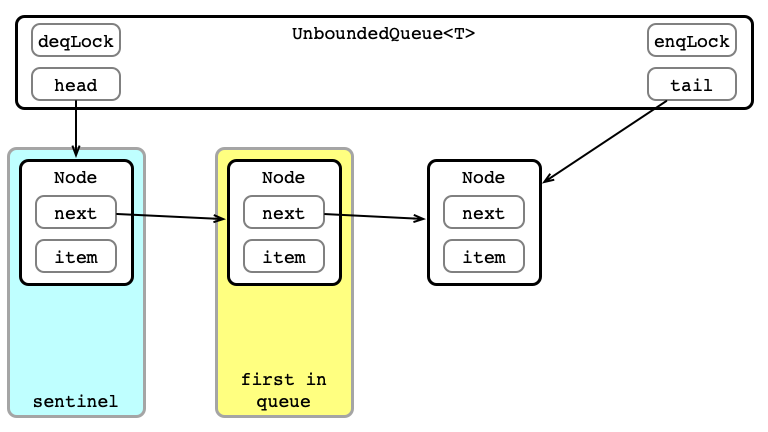
Dequeue 1: Aquire deqLock
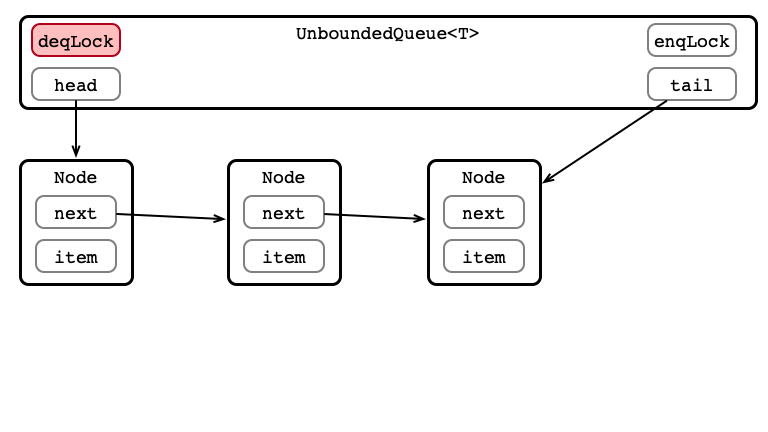
Dequeue 2: Get Element (or Exception)
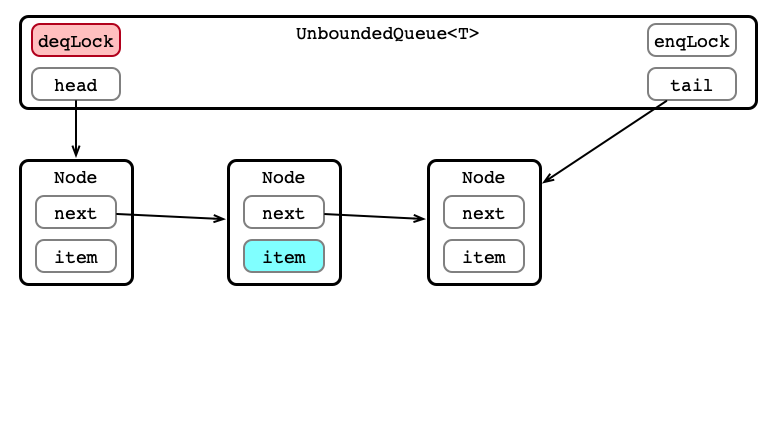
Dequeue 3: Update head
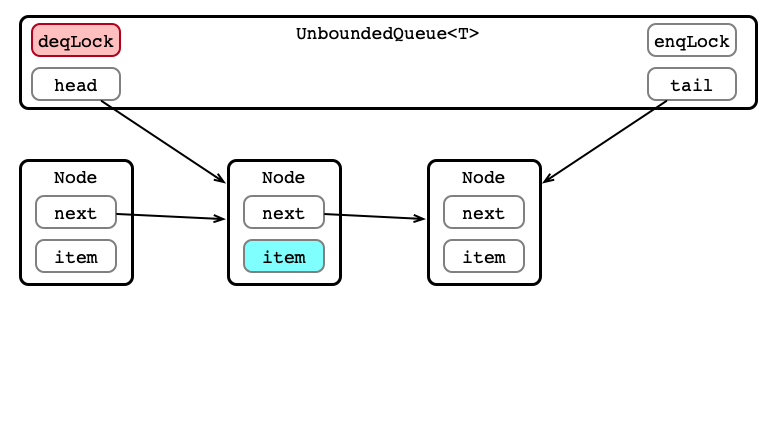
Dequeue 4: Release Lock
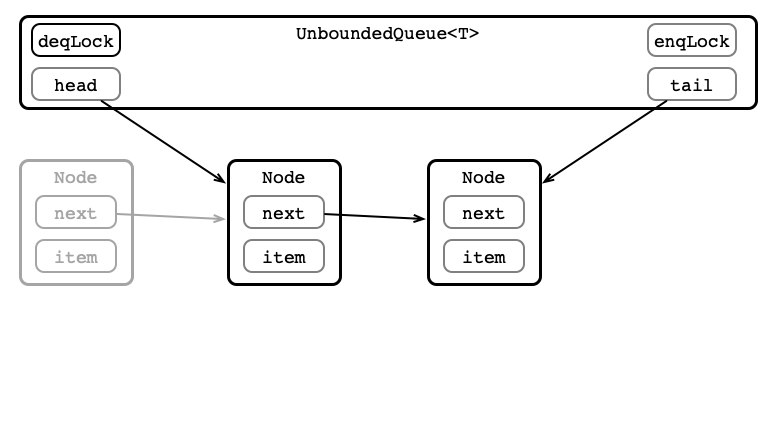
Enqueue 1: Make Node
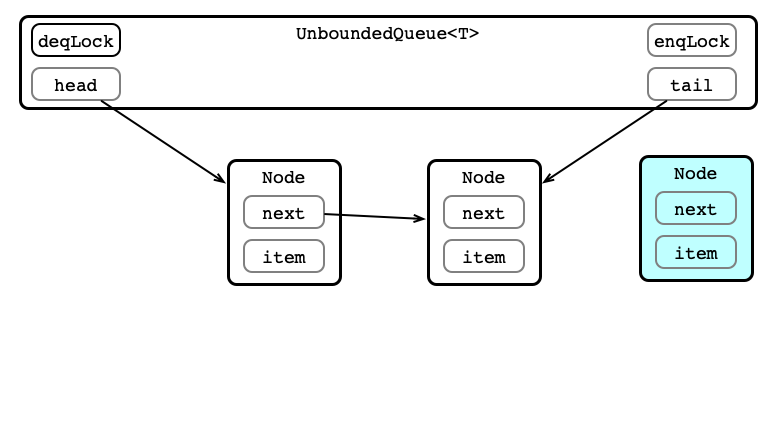
Enqueue 2: Acquire enqLock
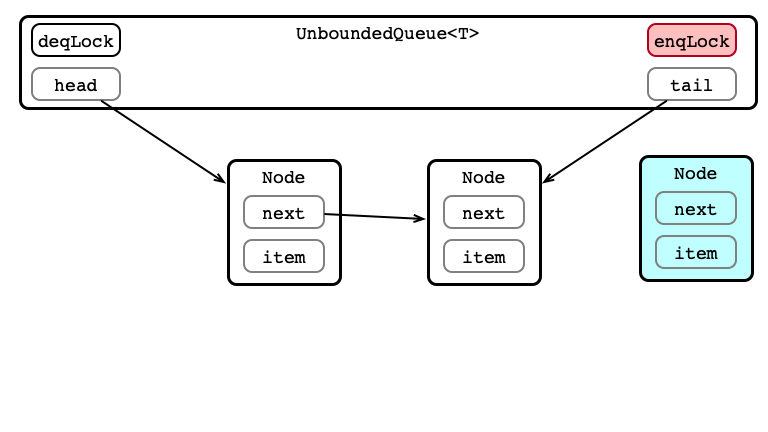
Enqueue 3: Update tail.next
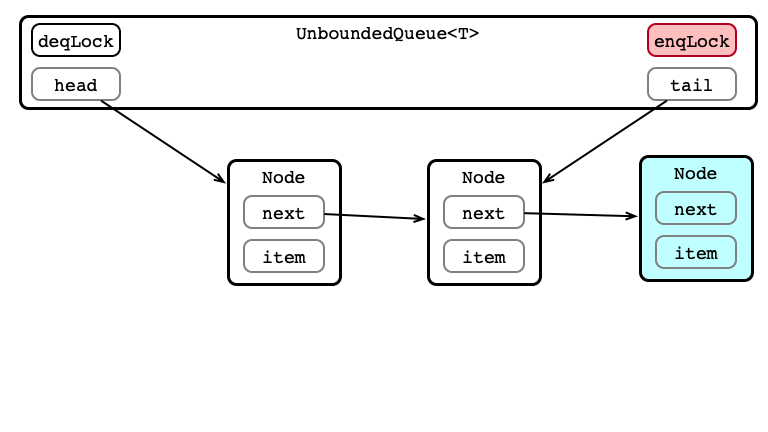
Enqueue 4: Update tail
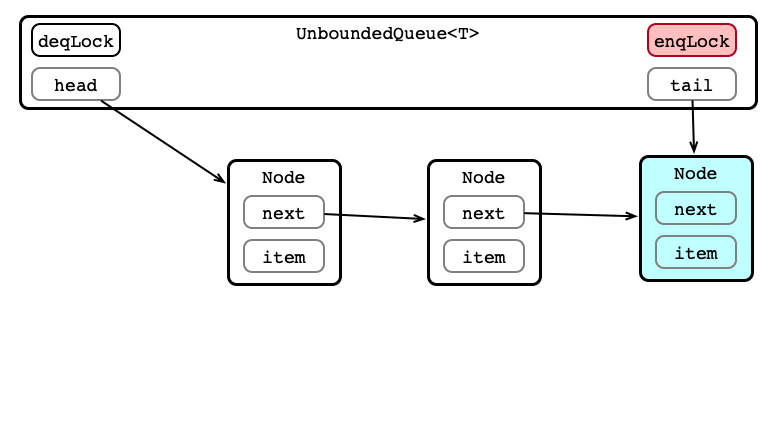
Enqueue 5: Release Lock
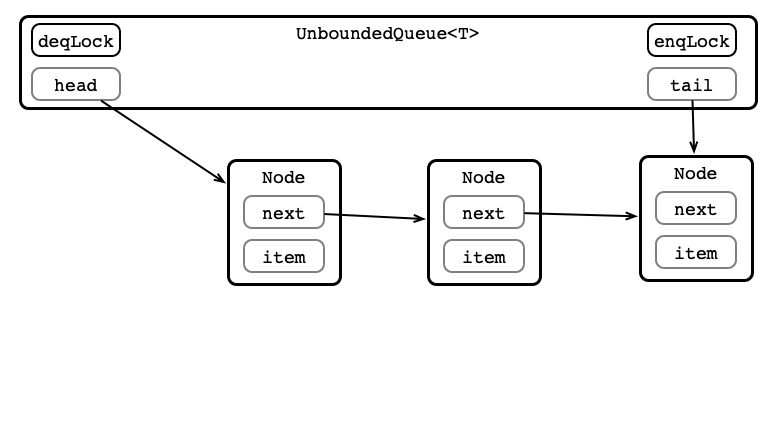
UnboundedQueue in Code
public class UnboundedQueue<T> implements SimpleQueue<T> {
final ReentrantLock enqLock;
final ReentrantLock deqLock;
volatile Node head;
volatile Node tail;
public UnboundedQueue() {
head = new Node(null); tail = head;
enqLock = new ReentrantLock();
deqLock = new ReentrantLock(); }
...
}
Node Class
class Node {
final T value;
volatile Node next;
public Node (T value) {
this.value = value;
}
}
enq Method
public void enq (T value) {
enqLock.lock();
try {
Node nd = new Node(value);
tail.next = nd;
tail = nd;
} finally {
enqLock.unlock();
}
}
deq Method
public T deq() throws EmptyException {
T value;
deqLock.lock();
try {
if (head.next == null){throw new EmptyException();}
value = head.next.value;
head = head.next;
return value;
} finally {
deqLock.unlock();
}
}
Is UnboundedQueue Linearizable?
- What concurrent operations do we need to consider?
- What internal states do we need to consider?
- What are the linearization points (if any)?
Pertinent Lines
public void enq (T value) {
Node nd = new Node(value);
tail.next = nd;
tail = nd;
}
public T deq() throws EmptyException {
if (head.next == null){throw new EmptyException();}
value = head.next.value;
head = head.next;
return value;
}
Conclusion
UnboundedQueue:
- is linearizable
- allows for concurrent progress on calls to
enqanddeq- if two threads each obtain
enqanddeqlocks, both terminate in a finite number of steps independent of the actions of the other
- if two threads each obtain
- uses locks
- concurrent calls to
enq(ordeq) are blocking: a thread cannot make progress while another thread holds the lock
- concurrent calls to
Question
Is it possible to implement a (sequentially consistent? linearizable?) queue without locks?
Enqueue Without Locks
What could go wrong with concurrent enq?
public void enq (T value) {
Node nd = new Node(value);
tail.next = nd;
tail = nd;
}
Possible Linearization Point?
public void enq (T value) {
Node nd = new Node(value);
tail.next = nd;
tail = nd;
}
New Tech: AtomicReferences
// an AtomicReference pointing to someNode
var nd = new AtomicReference<Node>(someNode);
// try to update nd to refer to updated
nd.compareAndSet(expected, update);
Effect of compareAndSet(expected, update):
- if
nd’s current value isexpected, then update value toupdate- return
true
- return
- if
nd’s current value is notexpected, do not update its value- return
false
- return
How Could Atomic References Help?
public void enq (T value) {
Node nd = new Node(value);
tail.next = nd;
tail = nd;
}
Enqueue Idea
To do:
- update
tail.nexttond - update
tailtond
How?
- Can update
tail.nextonly iftail.next == null - Try to update
tail.nexttond:- set
lasttotail,nexttotail.next - check if
lastis stillnull - update
last.nexttondonly iflast.nextis stillnull - if 3 fails, try to update
tailtonext
- set
LockFreeQueue
public class LockFreeQueue<T> implements SimpleQueue<T> {
private AtomicReference<Node> head;
private AtomicReference<Node> tail;
...
public void enq(T item) {...}
public T deq() throws EmptyException {...}
class Node {
public T value;
public AtomicReference<Node> next;
...
}
}
Lock Free enq
public void enq(T item) {
if (item == null) throw new NullPointerException();
Node node = new Node(item);
while (true) {
Node last = tail.get();
Node next = last.next.get();
if (last == tail.get()) {
if (next == null) {
if (last.next.compareAndSet(next, node))
tail.compareAndSet(last, node); return;
} else {
tail.compareAndSet(last, next);}}}}
Linearization Point (if any)?
public void enq(T item) {
if (item == null) throw new NullPointerException();
Node node = new Node(item);
while (true) {
Node last = tail.get();
Node next = last.next.get();
if (last == tail.get()) {
if (next == null) {
if (last.next.compareAndSet(next, node))
tail.compareAndSet(last, node); return;
} else {
tail.compareAndSet(last, next);}}}}
Questions (Next Time)
- How to dequeue?
- Which is better, locked or lock-free?